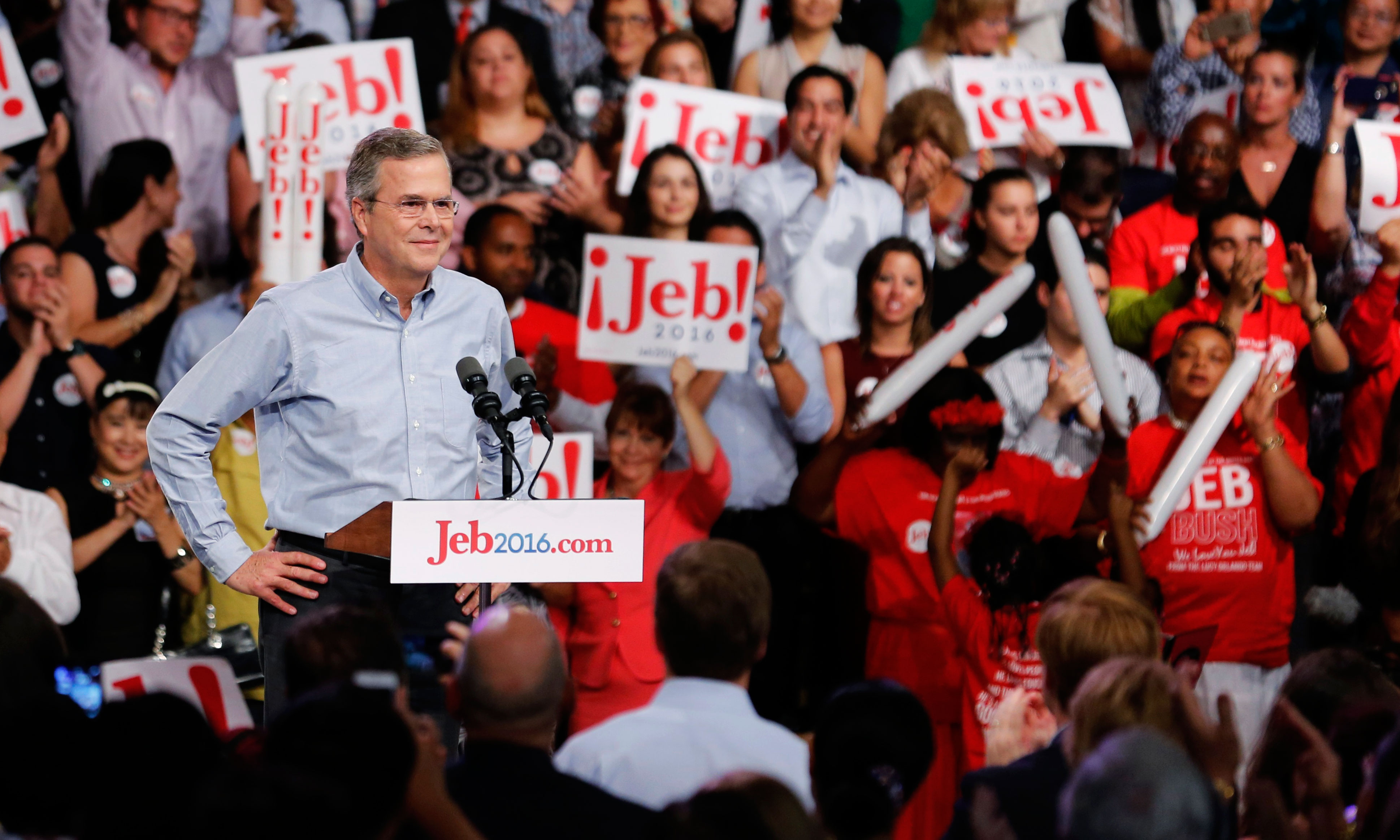Why Jeb Bush has to be twice as good as every other GOP candidate
With a name like Bush, you have to play a near perfect game


A free daily email with the biggest news stories of the day – and the best features from TheWeek.com
You are now subscribed
Your newsletter sign-up was successful
As Jeb Bush showed us with his campaign launch this week, he has all the right messaging. But he's going to have to work twice as hard as his opponents to prove that he's the right messenger.
Ever since he debuted his Super PAC Right to Rise, Jeb has been aiming his rhetorical fire at the common feeling of economic insecurity. He says that his primary opponents, many of them senators, just talk and debate, whereas he led a Florida economy that created 1.3 million jobs. And he promises as president that 19 million more new jobs will come to the American economy.
Bush also said some of the obligatory things expected of a serious Republican candidate. He has adopted the most modern-sounding language when it comes to cutting government, promising to "disrupt" it and "take Washington — the static capital of this dynamic country — out of the business of causing problems."
The Week
Escape your echo chamber. Get the facts behind the news, plus analysis from multiple perspectives.

Sign up for The Week's Free Newsletters
From our morning news briefing to a weekly Good News Newsletter, get the best of The Week delivered directly to your inbox.
From our morning news briefing to a weekly Good News Newsletter, get the best of The Week delivered directly to your inbox.
Bush also signaled his adherence to Reaganite Whiggishness: "In any language, my message will be an optimistic one because I am certain that we can make the decades just ahead in America the greatest time ever to be alive in this world." In other words, he won't be like Richard Nixon, sitting in a darkened Oval Office reading Oswald Spengler and cursing the light.
Occasionally Bush showed real flashes of the kind of messaging that can hold together an electoral coalition. His line connecting Barak Obama to Hillary Clinton — "They have offered a progressive agenda that includes everything but progress" — is one that sounds anti-left enough for conservatives, but also non-ideological and pragmatic to people who don't have the Drudge Report as their homepage.
Bush was also smart to run against legislators, since Congress is perpetually unpopular despite massive rates of re-election. In his defense of religious liberty against progressive interventions, he invoked the nuns who belong to The Little Sisters of the Poor, who were at the center of the controversy over ObamaCare's contraception mandate. "It comes down to a choice between the Little Sisters and Big Brother," Bush said, "and I'm going with the Sisters."
So far, so...okay. Other than a few lines, it doesn't get my motor going, but Bush's campaign seems as plausible as any electoral operation in a mass democracy. And despite some personnel changes and the Bush campaign's inability to scare off challengers not named Mitt Romney, his team does have the look and feel of a professional operation.
A free daily email with the biggest news stories of the day – and the best features from TheWeek.com
Talking about jobs and optimism is an appealing contrast in a Republican primary field crowded with people who are selling themselves almost entirely on being really, truly, authentically, pugilistically conservative. At some point, the crowd of true conservative alternatives will begin floating gimmick proposals. In an electoral competition, jobs will beat "I'm the mostest conservative" every time.
But in his logo, his speech, and even in his protestations to the media, Bush has been downplaying his last name. Notably absent from the stage where he made his announcement speech were the two relatives who have been president of the United States before.
Hey brother, wish me luck on the biggest day of my life. No, don't come, thanks.
And that is why Bush has to be the best fundraiser, the best speaker, and the best tactician in the primary race. The fact is that nominating Jeb Bush cancels out some of the rhetorical and generational advantages that a generic Republican nominee can have over Hillary Clinton. Her record and name can be tied to certain specific failures of American governance over the last two decades. Well, so can the Bush name.
Bush must prove that he can fend off some of the most obvious attacks on his economic record, namely that in Florida he was riding on dynamics created by Clinton-era prosperity. He promises 4 percent real growth, but when he experienced similar growth in Florida it turned out to be a housing bubble, which burst shortly after he left office. That is the kind of nominal growth that causes people to make horrible investments that can cripple their finances for a generation.
To get over that hump he has to be better than good — and something close to perfect.
Michael Brendan Dougherty is senior correspondent at TheWeek.com. He is the founder and editor of The Slurve, a newsletter about baseball. His work has appeared in The New York Times Magazine, ESPN Magazine, Slate and The American Conservative.
